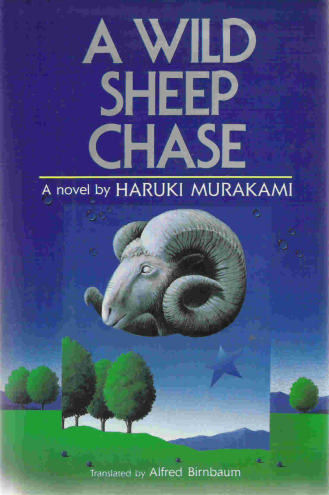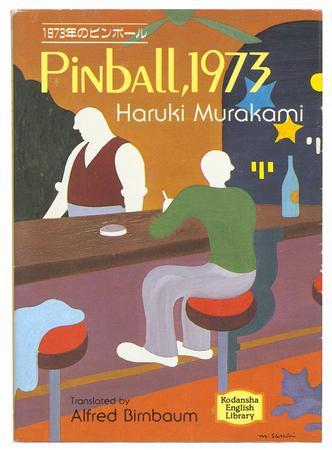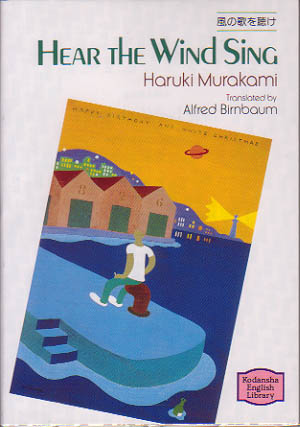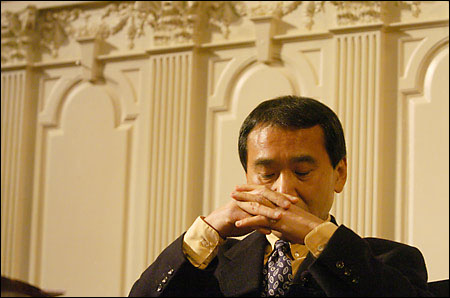|
|
| |
|
 Musings from the Edge of Forever
Musings from the Edge of Forever
Note: This blog expresses only the opinions of the blog owner,
and does not represent the opinion of any organization or blog
that is associated with RONIN ON EMPTY.
|
|
Archive for the ‘Haruki Murakami’ Category
Tuesday, October 19th, 2010

“With the job out of the picture, I felt a surge of relief. Slowly, but surely I was making things simpler. I’d lost my hometown, lost my teens, lost my wife, in another three months I’d lose my twenties. What’d be left of me when I got to be sixty, I couldn’t imagine. There’s no thinking about these things. There’s no telling even what’s going to happen a month from now” (Murakami 175).
We now come to the third, but not-so-final installment of Haruki Murakami’s “Trilogy of the Rat” — A Wild Sheep Chase. The English title, an invention of translator Alfred Birnbaum, provides a clever hook to an ever-so-engaging novel. Published as Hitsuji o meguru bōken in 1982, Wild Sheep Chase was later translated by the aforementioned Birnbaum in 1989 for the Kodansha English Library. I have that copy, which is split into two volumes; the Vintage paperback; and a first edition hardcover I found for a small sum in a dusty old bookstore in Santa Cruz, CA.*
A Wild Sheep Chase begins with the death of a woman that the protagonist knew back in college. In those days, she had a reputation for being promiscuous, and at one point, she was even casually involved with the narrator. However, upon learning of her death, he cannot recall her name, referring to her only as “the girl who would sleep with anyone.” After the narrator returns home from the funeral, we discover that his home life is in disarray, as he’s in the process of getting a divorce. He tells his old friend, the bartender J, that it’s lucky they didn’t want kids. He says:”I don’t really know if it’s the right thing to do, making new life. Kids grow up, generations take their place. What does it all come to? More hills bulldozed and more oceanfront filled in? Faster cars and more cats run over? Who needs it?” (105). Hope doesn’t exactly spring eternal with this guy.
In no time, he finds himself dating a call girl-turned-model, who is known for her two best assets. No, not those — her ears. They are, in the narrator’s estimation, the most beautiful ears he’s seen in his entire life and they possess near magical properties. Weird, eh? But as mysterious as his new gal pal is, what our hero really longs for is a sense of sustained normalcy. He soon tells his new girlfriend, “Most people, they’re trying to escape from boredom, but I’m trying to get into the thick of boredom” (43). However, like any hardboiled dick, he soon finds himself right in the thick of trouble…with peculiar results.
(more…)
Posted in Japanese Literature, Haruki Murakami | 1 Comment »
Thursday, September 30th, 2010

When I started reading Haruki Murakami’s work, the going rate on eBay for Kodansha’s English translation of Pinball 1973 was well over $250 a copy. I couldn’t and still can’t afford to pay that much for a novel (and wouldn’t if I could), and until recently, the only version I had of Alfred Birnbaum’s translation was one that had been transcribed onto a Microsoft Word document. I figured until a US/UK publisher got the rights, I’d be stuck with my digital copy. Well, never fear — it looks like the English translation of Pinball 1973 finally came back into print in Japan because I just bought it for $15 from an eBay seller.
In any event, both Pinball 1973 and its predecessor, Hear the Wind Sing, provide interesting, if entirely non-compulsory backstory to the events of Murakami’s more internationally known work, Wild Sheep Chase — in fact, the three books form what Murakami calls, “The Trilogy of the Rat.” J’s Bar, the novel’s unnamed narrator, his business partner, and the aforementioned Rat all get introduced in these two early works. Both of these slender tomes provide an interesting primer to all things Murakami: references abound to author fetishes like elephants, ears, spaghetti, suicide by hanging in a forest, an old girlfriend named Naoko, and wells — the deep, dark bottomless kind. (more…)
Posted in Japanese Literature, Haruki Murakami | No Comments »
Wednesday, September 29th, 2010

“You keep looking at the sea and you start to miss being with people; you stay around people all the time and you just want to look at the sea. Funny about that.”
For reasons that aren’t entirely clear to me, I decided to start reading Haruki Murakami again. As a warm-up, I read Jay Rubin’s Haruki Murakami and the Music of Words before plunging once again into Murakami’s first novel, Hear the Wind Sing. I did something like this before with my previous blog when I heard that a film adaptation of Norwegian Wood was in the works, and now that Tran Anh Hung’s version has been filmed, perhaps that’s part of the impetus to reacquaint myself with the work of one of my favorite authors. My last attempt at a Murakami marathon didn’t get quite as far as I planned (I had, quite ambitiously, thought I would read all of Murakami’s books in the order they were published in Japan and then write about them), but I think I might give it another go.
Published as Kaze no Uta o Kike in 1979, Hear the Wind Sing wasn’t translated until 1987 by Alfred Birnbaum. And funnily enough, the English translations for this novel and his second book, Pinball 1973 — have never been made available by any American publisher. They are only published in Japan as part of the Kodansha English Library. To my knowledge, Murakami has never provided an actual answer as to why these works have not been published in the West, but each novel’s length as well as its narrative content may factor into the decision. However, thanks to ebay and Amazon, these books are not completely out of reach.
According to the author, the idea for the book originated when Murakami was watching a baseball game. He became possessed with the idea that he must write a novel, and so, while running the bar Peter Cat for his father-in-law, Murakami would write for an hour every night for the next three months. After submitting the finished manuscript to a literary magazine, he won the Gunzo Literary Prize right off the bat. Not a bad start, eh?
(more…)
Posted in Japanese Literature, Haruki Murakami | No Comments »
Wednesday, September 22nd, 2010

The vast majority of my favorite authors share one distinguishing quality — they’re all dead. So unless the Umbrella Corporation unleashes a T-Virus on the graves of some of my literary idols, I don’t think I’ll ever have the chance to get Mark Twain’s autograph in person or pick Raymond Chandler’s brain (literally, if we’re sticking to this Resident Evil scenario) about his most famous creation, Philip Marlowe. It’s simply a fact I’ve come to accept.
However, there is one living author whom I would very much like to meet — Haruki Murakami. But seeing as how he lives in Japan and I don’t, the chances of running into the guy seemed somewhere between slim and none.
In April of 2007, Mr. Murakami made an appearance at the University of Hawai’i at Manoa to kick off the annual Celebrate Reading: Book Clubs and Literature Festival. Unfortunately, I had already graduated from the University of Hawai’i and was in the midst of my first year at UC-Santa Cruz when he gave his talk. I was bummed out about it, but luckily, he showed up at UC-Berkeley to give another talk and accept the Berkeley Japan Prize. This time around, I got to attend his lecture. Murakami was an amusing, quirky, and engaging speaker, but unfortunately, I never got to ask him a question or get his autograph. Maybe next time.
(more…)
Posted in Haruki Murakami | No Comments »
|
|
|
| |
| |
|
|
|
|
|
|
|
|
|
|
|
|
|
|
|
|
|
|
|
|
|
|
|
|
|
|
|
|
|
|
|
|
|
|
|
|
|
|
|
|
|
|
|
|
|
|
|
|
|
|
|
| LoveHKFilm.com
Copyright © 2002-2025 Ross Chen |
|
|





